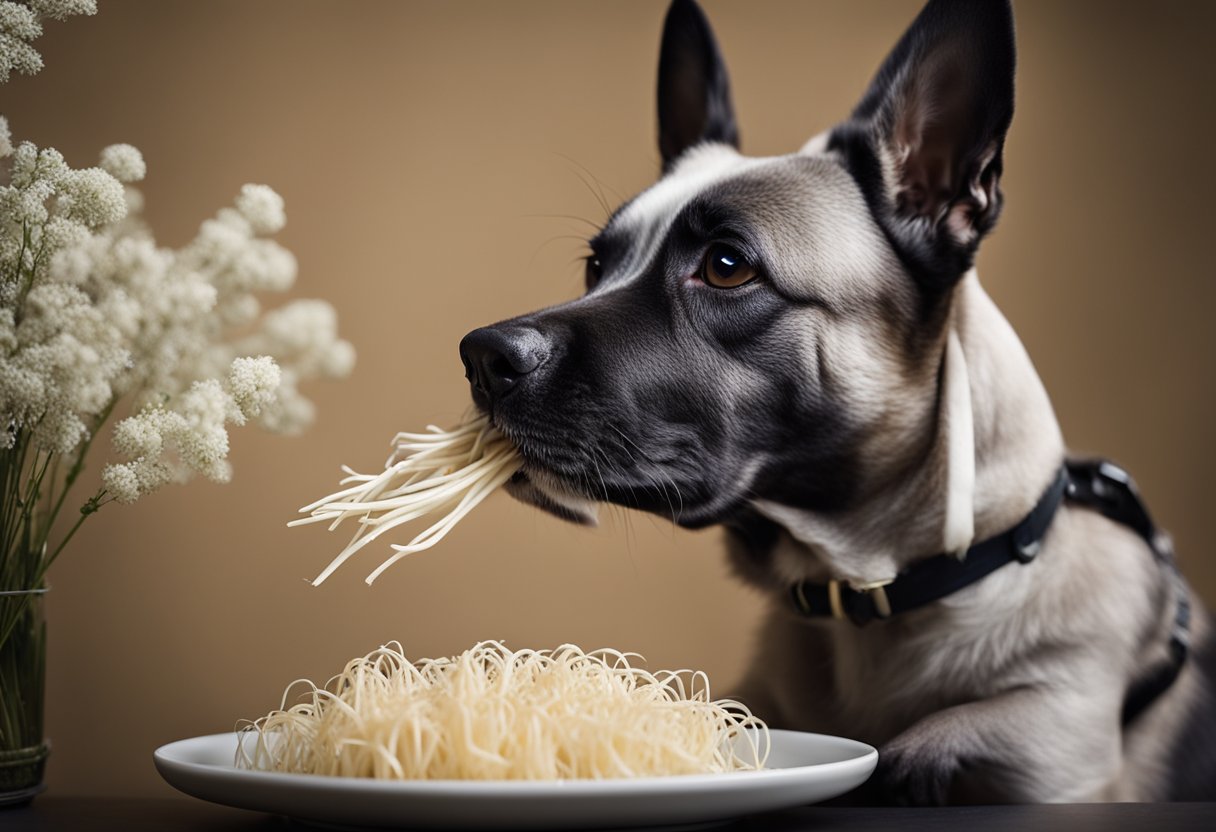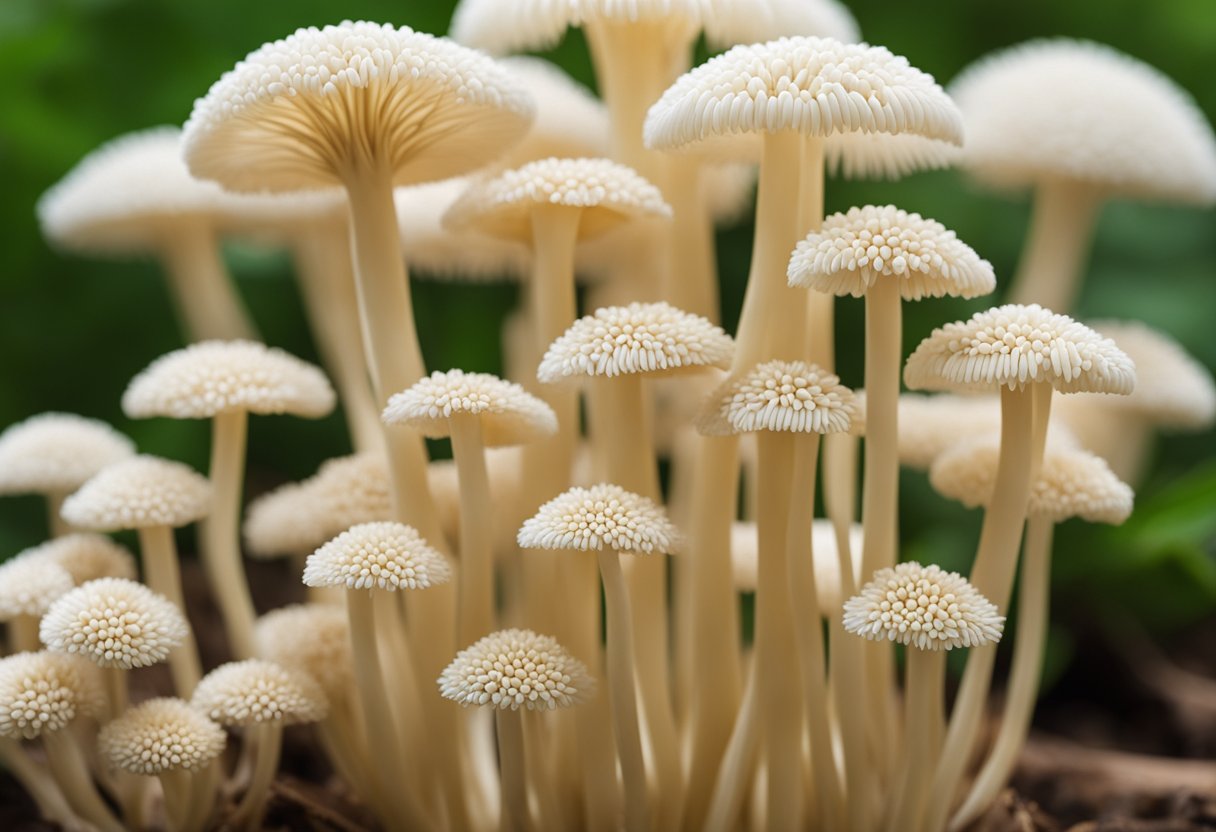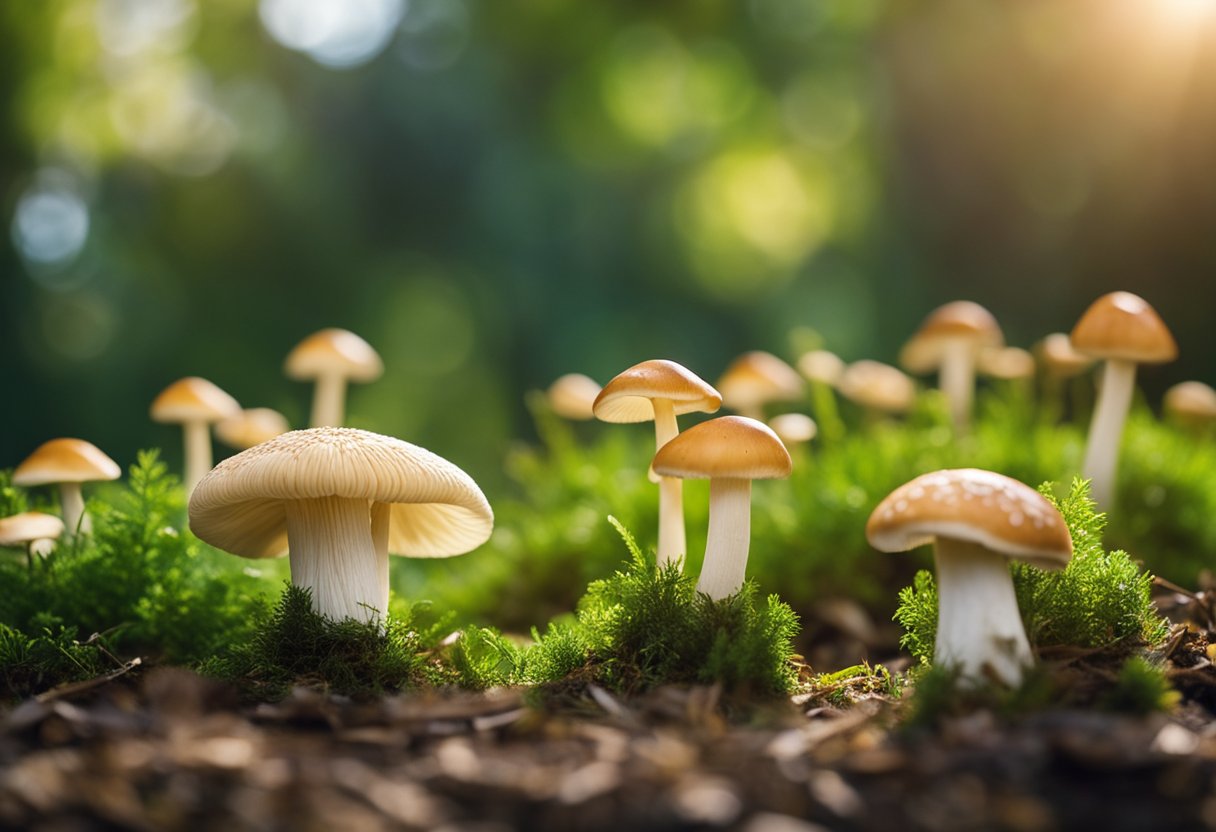As a dog owner, it’s important to be aware of what foods are safe for your furry friend to consume. One food that may be on your radar is enoki mushrooms. Enoki mushrooms are a type of mushroom commonly used in Asian cuisine, and they have a unique appearance with long, thin stems and small caps. But can dogs eat enoki mushrooms?

Unfortunately, the answer is no. Enoki mushrooms, along with many other types of mushrooms, are not safe for dogs to eat. In fact, some mushrooms can be toxic to dogs and cause serious health issues, such as liver failure. While enoki mushrooms may not be as toxic as some other varieties, it’s still best to err on the side of caution and avoid feeding them to your dog.
Can Dogs Eat Enoki Mushrooms?
https://www.youtube.com/watch?v=gUp4-w257mo&embed=true
As a pet owner, it is essential to know what foods are safe for your furry friend to consume. Enoki mushrooms are a popular ingredient in many dishes, but can dogs eat them? The answer is no; dogs should not eat enoki mushrooms.
Enoki mushrooms contain a toxin called gyromitrin, which can cause liver damage and even death in dogs. Symptoms of gyromitrin poisoning in dogs include vomiting, diarrhea, abdominal pain, and lethargy. If you suspect your dog has ingested enoki mushrooms, seek veterinary care immediately.
It is also important to note that some dogs may have an allergic reaction to mushrooms, including enoki mushrooms. Signs of a mushroom allergy in dogs include itching, hives, and difficulty breathing. If your dog exhibits any of these symptoms after consuming mushrooms, contact your veterinarian right away.
To keep your dog safe, it is best to avoid feeding them enoki mushrooms or any other mushrooms. Stick to a balanced diet of dog food and treats specifically formulated for canines. If you want to give your dog a special treat, opt for dog-friendly fruits and vegetables like apples, carrots, and green beans.
In conclusion, dogs should not eat enoki mushrooms due to the presence of the toxin gyromitrin. If you suspect your dog has ingested enoki mushrooms or exhibits signs of a mushroom allergy, seek veterinary care immediately. Stick to a balanced diet of dog food and treats specifically formulated for canines to keep your furry friend healthy and happy.
Understanding Mushrooms and Dogs
https://www.youtube.com/watch?v=uhxOL2RTNcw&embed=true
The Nature of Mushrooms
Mushrooms are a type of fungi that come in a wide range of shapes, sizes, and colors. Some mushrooms are edible and are used in cooking, while others are toxic and can cause serious harm if ingested. It is important to understand the nature of mushrooms and the risks associated with consuming them, especially when it comes to our furry friends.
Wild mushrooms, in particular, can be dangerous for both humans and dogs. There are thousands of different species of wild mushrooms, and many of them are toxic. It can be difficult to distinguish between edible and poisonous mushrooms, and even experienced foragers can make mistakes. Therefore, it is best to avoid feeding wild mushrooms to your dog.
Store-bought mushrooms, on the other hand, are generally safe for dogs to eat as long as they are cooked properly. Some of the most commonly consumed mushrooms, such as portobello mushrooms, are not toxic to dogs and can be a healthy addition to their diet.
Dogs and Mushroom Consumption
While some mushrooms are safe for dogs to eat, others can be toxic and even deadly. Enoki mushrooms, for example, are not safe for dogs to eat. Enoki mushrooms contain a toxin called gyromitrin, which can cause vomiting, diarrhea, and even seizures in dogs.
It is important to note that some dogs may be more susceptible to the toxic effects of mushrooms than others. For example, small dogs and puppies may be more at risk due to their size and weight. Additionally, dogs with underlying health conditions may be more vulnerable to the toxic effects of mushrooms.
If you suspect that your dog has eaten a toxic mushroom, it is important to seek veterinary care immediately. Symptoms of mushroom poisoning can range from mild to severe and can include vomiting, diarrhea, lethargy, seizures, and even death.
In conclusion, while some mushrooms are safe for dogs to eat, it is important to exercise caution and to avoid feeding wild mushrooms to your furry friend. If you are unsure about the safety of a particular mushroom, it is best to err on the side of caution and to consult with your veterinarian.
Potential Dangers of Dogs Eating Mushrooms
https://www.youtube.com/watch?v=RvRqDeRf98Y&embed=true
As a responsible pet owner, it is essential to be aware of the potential dangers of dogs eating mushrooms. While some mushrooms are safe for dogs to eat, many wild mushrooms are poisonous and can cause severe health problems, including death.
Poisonous Mushrooms
Some of the most toxic mushrooms for dogs include amanita phalloides (death cap), galerina marginata, amanita muscaria (fly agaric), false morel, amanita gemmata, clitocybe dealbata, jeweled deathcap, and inocybe. These mushrooms contain toxins that can cause liver failure, seizures, coma, and even death.
Symptoms of Mushroom Poisoning
If your dog has ingested a toxic mushroom, they may exhibit symptoms of mushroom poisoning, including vomiting, diarrhea, abdominal pain, lethargy, weakness, drooling, jaundice, tremors, ataxia, and seizures. In severe cases, dogs may experience liver failure, which can be fatal.
If you suspect your dog has ingested a poisonous mushroom, seek immediate veterinary care. Treatment may include inducing vomiting, administering activated charcoal, and providing supportive care to manage symptoms.
It is crucial to keep your dog away from wild mushrooms and to only feed them mushrooms that are safe for consumption. Additionally, if you are unsure if a mushroom is safe for your dog to eat, it is best to err on the side of caution and avoid feeding it to them altogether.
In conclusion, while mushrooms can be a healthy addition to your dog’s diet, it is essential to be aware of the potential dangers of dogs eating mushrooms. By taking the necessary precautions and seeking veterinary care immediately if you suspect mushroom poisoning, you can help keep your furry friend safe and healthy.
Health Benefits and Risks of Enoki Mushrooms for Dogs

Enoki mushrooms are a popular ingredient in many Asian dishes and are often used in soups, salads, and stir-fries. While these mushrooms are safe for human consumption, pet owners may wonder whether their furry friends can eat them too. In this section, I will discuss the potential health benefits and risks of enoki mushrooms for dogs.
Nutritional Value of Enoki Mushrooms
Enoki mushrooms are low in calories and fat, making them a healthy addition to any diet. They are also a good source of vitamins and minerals such as potassium, iron, and magnesium. Additionally, enoki mushrooms contain antioxidants that can help protect against cellular damage and reduce the risk of chronic diseases.
However, it is important to note that dogs have different nutritional requirements than humans. While enoki mushrooms are safe for dogs to eat in moderation, they should not be a primary source of nutrition for your furry friend.
Potential Risks
Although enoki mushrooms are generally safe for dogs, there are some potential risks to be aware of. Firstly, some dogs may be allergic to mushrooms, including enoki mushrooms. Signs of an allergic reaction may include vomiting, diarrhea, and skin irritation.
Additionally, enoki mushrooms contain a type of natural sugar called trehalose, which can be harmful to dogs with certain health conditions. Dogs with diabetes or other blood sugar issues should avoid eating enoki mushrooms, as they may cause a sudden spike in blood sugar levels.
Finally, some types of mushrooms, including the death cap mushroom, can be toxic to dogs. It is important to ensure that any mushrooms your dog consumes are safe for them to eat.
In conclusion, while enoki mushrooms can provide some nutritional benefits for dogs, they should be given in moderation and only as part of a balanced diet. As with any new food, it is important to introduce enoki mushrooms slowly and monitor your dog for any signs of an adverse reaction. If you have any concerns about feeding your dog enoki mushrooms, consult with your veterinarian.
Safe Alternatives to Mushrooms for Dogs

As a dog owner, it’s important to ensure that your furry friend is eating a balanced and healthy diet. While mushrooms can be a nutritious addition to your dog’s diet, some varieties can be toxic and cause serious health problems. If you’re unsure about whether or not your dog can eat enoki mushrooms, it’s best to err on the side of caution and avoid them altogether.
Fortunately, there are plenty of safe alternatives to mushrooms that you can incorporate into your dog’s diet. Here are some of the best options:
Fruits and Vegetables
Fruits and vegetables are a great source of vitamins and minerals for dogs. Some of the best options include blueberries, carrots, green beans, sweet potatoes, peas, cucumbers, and apples. These foods are low in calories and high in fiber, making them a great addition to any dog’s diet.
Lean Proteins
Lean proteins like chicken, turkey, and fish are an excellent source of protein for dogs. These foods are low in fat and calories, making them a great option for dogs who need to lose weight. Just be sure to cook the meat thoroughly and remove any bones before feeding it to your dog.
Safe Treats
If you’re looking for a tasty treat to give your dog, there are plenty of safe options to choose from. Some of the best treats include peanut butter, cheese, and plain popcorn. Just be sure to avoid treats that are high in sugar or fat, as these can lead to weight gain and other health problems.
Recipes
If you’re feeling creative, there are plenty of recipes for homemade dog food and treats that you can try. Just be sure to use ingredients that are safe for dogs and avoid any that are toxic. Some great recipes to try include homemade chicken and vegetable stew, peanut butter and banana dog treats, and frozen yogurt dog treats.
In conclusion, while mushrooms can be a healthy addition to your dog’s diet, it’s important to choose the right varieties and to feed them in moderation. If you’re unsure about whether or not your dog can eat enoki mushrooms, it’s best to avoid them altogether and choose one of the safe alternatives listed above.
When to Consult a Veterinarian
As a responsible dog owner, it is essential to be aware of the potential risks and dangers that certain foods can pose to your furry friend. Enoki mushrooms are one such food that can be harmful to dogs if consumed in large quantities. While small amounts of enoki mushrooms may not cause any adverse effects, it is crucial to monitor your dog’s behavior after they have consumed these mushrooms.
If you notice any symptoms such as excessive drooling, difficulty breathing, or organ failure, it is essential to seek veterinary care immediately. These symptoms can be a sign of liver damage, which can be life-threatening if left untreated.
It is always better to err on the side of caution when it comes to your pet’s health. If you suspect that your dog has ingested enoki mushrooms or any other toxic substance, contact your veterinarian immediately. They will be able to provide you with the necessary guidance and treatment to ensure your dog’s well-being.
It is also important to note that some dogs may be more susceptible to the harmful effects of enoki mushrooms than others. For example, dogs with pre-existing medical conditions or those taking certain medications may be at a higher risk of experiencing adverse effects. Therefore, it is crucial to consult with your veterinarian before feeding your dog any new foods or medications.
In conclusion, while enoki mushrooms may be safe for human consumption, they can be harmful to dogs. It is always best to consult with your veterinarian if you suspect that your dog has consumed any toxic substances. By being mindful of your pet’s diet and seeking veterinary care when necessary, you can help ensure that your furry friend remains happy and healthy.






